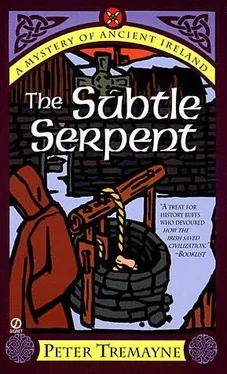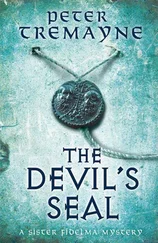Peter Tremayne - The Subtle Serpent
Здесь есть возможность читать онлайн «Peter Tremayne - The Subtle Serpent» весь текст электронной книги совершенно бесплатно (целиком полную версию без сокращений). В некоторых случаях можно слушать аудио, скачать через торрент в формате fb2 и присутствует краткое содержание. Жанр: Исторический детектив, на английском языке. Описание произведения, (предисловие) а так же отзывы посетителей доступны на портале библиотеки ЛибКат.
- Название:The Subtle Serpent
- Автор:
- Жанр:
- Год:неизвестен
- ISBN:нет данных
- Рейтинг книги:3 / 5. Голосов: 1
-
Избранное:Добавить в избранное
- Отзывы:
-
Ваша оценка:
- 60
- 1
- 2
- 3
- 4
- 5
The Subtle Serpent: краткое содержание, описание и аннотация
Предлагаем к чтению аннотацию, описание, краткое содержание или предисловие (зависит от того, что написал сам автор книги «The Subtle Serpent»). Если вы не нашли необходимую информацию о книге — напишите в комментариях, мы постараемся отыскать её.
The Subtle Serpent — читать онлайн бесплатно полную книгу (весь текст) целиком
Ниже представлен текст книги, разбитый по страницам. Система сохранения места последней прочитанной страницы, позволяет с удобством читать онлайн бесплатно книгу «The Subtle Serpent», без необходимости каждый раз заново искать на чём Вы остановились. Поставьте закладку, и сможете в любой момент перейти на страницу, на которой закончили чтение.
Интервал:
Закладка:
‘Bury her well. The Mórrígu has awakened!’
Her face whitened. She sat up stiffly and found the abbess’s eye quizzically regarding her.
‘You recognise what that is?’ Abbess Draigen asked softly.
Fidelma nodded slowly: ‘It is a fé .’
A fé , or rod of aspen, usually with an Ogham inscription, was the measurement by which corpses and graves were calibrated. The fé was the tool of a mortician and was regarded with utmost horror so that no one, on any consideration, would take it in their hand or touch it, except, of course, the person whose business it was to measure corpses and graves. A fé had been the symbol of death and ill-luck since the days of the old gods. Still, the worst imprecation that could be uttered at any person was ‘may the fé be soon measuring you’.
There was a silence as Fidelma sat for a long time staring down at the aspen wood.
It was only when she heard a soft but exasperated sigh that she stirred herself and raised her eyes to meet those of the Abbess Draigen.
It was clear that the abbess knew well what the rod symbolised for her face was troubled.
‘You see, now, Fidelma of Kildare, why I could not allow the local bó-aire to assume his magisterial powers on this matter? You see now why I sent a message to Abbot Brocc to dispatch a dálaigh of the Brehon courts who was answerable to none save the king of Cashel?’
Fidelma returned her gaze with serious eyes.
‘I understand, mother abbess,’ she said quitely. ‘There is much evil here. Much evil.’
It took Fidelma some time to fall asleep. Snow was fallingheavily now but it was not the chill air permeating her cell which caused her to have difficulty in sleeping. Neither was it the conundrum of the headless body that stirred her thoughts and kept her awake as she tried to quell the anxiety that they produced. Twice she took the small Missal from her side table and turned it over and over in her hands, peering at it as if it would produce an answer to her questions.
What had happened to Eadulf of Seaxmund’s Ham?
Twelve months ago or more she had parted from Eadulf on the wooden quay near the Bridge of Probi in Rome and had handed him this little Mass Book as a gift. There was her inscription on its first page.
Twice she and Eadulf had been thrown together to investigate deaths of members of their respective churches and found that, while opposite in character, they found mutual attraction and complementary talents in their pursuit of solutions to the problems they had been set. Then the time came for them to go their different ways. She had to return to her homeland and he had been appointed scriptor and advisor to Theodore, of Tarsus, the newly appointed archbishop of Canterbury, Rome’s chief apostle to the Saxon kingdoms. Theodore, being a Greek, and only a recent convert to the Church of Rome, required someone to instruct him in the ways of his new spiritual charges. Even though Fidelma had thought, at the time, that she would never see Eadulf again, she had found her thoughts gravitating more and more to memories of the Saxon monk. She had been experiencing feelings of isolation and had only recently come to admit to herself that she missed the companionship of Eadulf.
Now she was faced with a mystery that was more aggravating to her mind than any of the riddles she had been called to solve before.
Why was this small Missal, her parting gift to Eadulf in Rome, on a deserted Gaulish merchant ship, an entire world away, off the coast of south-west Ireland? Had Eadulf been a passenger on that vessel? If so, where was he? If he had not,who had possessed the book? And why would Eadulf have parted company with her gift?
Eventually, despite the throbbing questions in her head, sleep caught her unawares.
Chapter Five
Fidelma was awakened by Sister Brónach while it was still dark although there was that tell-tale texture to the sky which foretold the imminent arrival of dawn. A bowl of warm water was placed for her toilet and a candle was left burning so that she could accomplish this task in comfort. It was intensely cold at this early hour. She had barely finished dressing when a slow chiming bell began to sound. Fidelma recognised it as the traditional ‘death-bell’ which custom decreed should be rung to mark the passing of a Christian soul. A moment later Sister Brónach returned, head bowed, eyes floor-ward.
‘It is time for the observance, sister,’ she whispered.
Fidelma acknowledged and followed her out of the guests’ hostel, to the duirthech where the entire community appeared to have gathered. To her surprise, the snow of the previous evening had not lain around the abbey buildings, though a glance showed that a thin layer of snow covered the surrounding woods and hills beyond. There was an eerie white glow to the early morning.
Inside the wooden chapel building, it was so cold that someone had lit a fire which blazed in a brazier standing at the back. The damp and cold struck up from the stone flags of the floor of the duirthech. The Abbess Draigen was kneeling behind the altar on which a large, and rather magnificent, tall gold cross stood, almost dominating the chapel. Before the altar, in front of the congregation, stood the fuat , the funeral bier, on which the body of the unknown girl had been laid.
Fidelma took her place on the end bench next to Sister Brónach. She was thankful for the warmth from the nearby brazier. She looked round, appreciatively taking in the opulence of the furnishings of the wooden chapel. As well as the richness of the altar cross, the walls were hung with numerous icons with gold fixtures conspicuous everywhere. She presumed that the obsequies had been observed since last night. The corpse was now wrapped in a racholl, a white linen shroud. At each corner of the bier a candle fluttered in the slight morning breeze.
The Abbess Draigen stood up and slowly began to clap her hands in the traditional lámh-comairt which signified the lamentation for the dead. Then the sisters began to start a soft wailing cry — the caoine, the sorrowing. It was a chilling sound in the half light of early morning and caused Fidelma’s neck to tingle although she had heard it so many times before. The lament to the dead was a custom which went back to the time before the new Faith had displaced that of the old gods and goddesses.
After ten minutes the caoine stopped.
Abbess Draigen stepped forward. At this point in the ritual it was customary for the amra, or elegy, to be given.
It was then that there came a strange noise, seeming to well up from beneath the stone floor of the chapel. It was not particularly loud. It was an odd scraping sound, a deep, hollow scuffling sound as when two wooden boats bump against one another, bobbing on the waves of the sea. The members of the community peered fearfully at one another.
Abbess Draigen raised a slim hand for silence.
‘Sisters, you forget yourselves,’ she admonished.
Then she bent her head to continue the service.
‘Sisters, we are mourning one who is unknown to us and therefore no elegy can mark her passing. A unknown soul has sped to God’s holy embrace. Yet she is known to God and that is enough. That the hand that cut short this life is also known to God may also be accepted. We lament the passingof this soul but rejoice in the knowledge that it has passed to God’s good keeping.’
Six of the sisters of the community moved forward, at a signal from the abbess, and lifted the bier to their shoulders and then, led by the abbess, they moved out of the chapel followed by the rest of the community, forming a double line in the wake of the bier.
Читать дальшеИнтервал:
Закладка:
Похожие книги на «The Subtle Serpent»
Представляем Вашему вниманию похожие книги на «The Subtle Serpent» списком для выбора. Мы отобрали схожую по названию и смыслу литературу в надежде предоставить читателям больше вариантов отыскать новые, интересные, ещё непрочитанные произведения.
Обсуждение, отзывы о книге «The Subtle Serpent» и просто собственные мнения читателей. Оставьте ваши комментарии, напишите, что Вы думаете о произведении, его смысле или главных героях. Укажите что конкретно понравилось, а что нет, и почему Вы так считаете.











